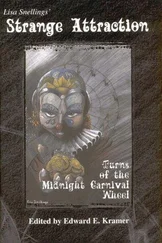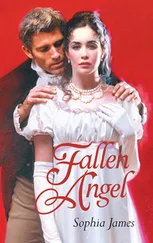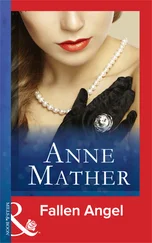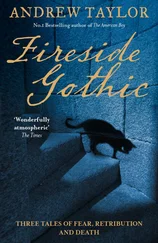Then, with an abruptness which made him gasp, this pleasant reverie was shattered.
‘Aren’t they sweet?’ Angel sat down beside him. ‘All that energy. Where do they get it from?’
Eddie stared wildly at her. Her sudden appearance would have shocked him in normal circumstances and brought about another attack of shyness. But this was worse. Had his face revealed something of his thoughts? Angel was a nanny. She would be alert for strange men who watched children.
‘It’s a lovely day for the Heath. The best part of summer.’
‘Yes,’ he managed to say. ‘Very sunny.’
The breeze blew a strand of her hair towards him. She smoothed it back into place. For an instant her sleeve brushed his and he smelt her perfume. She was wearing a blue sweatshirt and jeans. Her left hand was now lying on her leg, long-fingered, smooth-skinned, the nails not quite oval but egg-shaped, with the narrow ends embedded in the fingers; she wore no rings.
He looked away, worried that she might think he was staring at her. To his relief the two girls were running down the hill, shrieking to someone below. He no longer had to worry about betraying his interest in them.
‘Would you like one?’ Bewildered, Eddie turned towards her, for a moment thinking she was referring to the girls. But Angel was holding out a packet of Polos to him, the foil at the end of the tube peeled back. He took one because a refusal might offend her. For a moment they sat in silence. The mint seemed unnaturally strong, and he coughed.
‘I like coming here,’ Angel said. ‘So nice to see the children playing.’
Eddie bit hard on the Polo, and it disintegrated. Two boys on the fringe of puberty raced by on their bikes. One of them dropped a crisp packet as he passed.
‘When they’re older, they’re not nearly so appealing. Don’t you agree?’ She seemed not to expect an answer. ‘But I wouldn’t like to have children around all the time. They can be very tiring. What about you?’
Hastily he swallowed the fragments of Polo, the sharp edges snagging against his throat. ‘I’m sorry?’
She smiled at him. ‘I wondered if you’d like children of your own. I know I wouldn’t.’
‘No.’ The word came out much more vehemently than Eddie had intended. He thought of the boys on the bicycles, of Mandy and Sian at Dale Grove Comprehensive, and of all the children who grew up. He was frightened that he might have revealed too much, so he took refuge in a generality. ‘I think there’re far too many people in the world as it is. Five and a half billion, isn’t it, and more being born every day.’
Angel nodded, her face serious. ‘That’s a very good point.’ Her tone implied that she’d never considered the question from that angle before. ‘Still, they are sweet when they’re young, aren’t they? That’s what I like about my job. I get most of the fun, but none of the long-term responsibility.’
‘That must be nice.’
They sat there for another five minutes, talking in spurts about the city below them and its history. Slowly Eddie relaxed. He was surprised to find that he was enjoying the conversation, or rather the novelty of having someone to talk to.
‘By the way, how did our road get its name?’ Angel asked. ‘I asked your mother but she didn’t know.’
‘It’s because back in the Middle Ages the land round there used to belong to the Bishop of Rosington.’
A cloud slid across the sun.
‘I thought it might be that. It’s getting cold.’ Angel hugged herself, dramatizing the words. ‘Shall we find a cup of coffee? There’s a café on South End Green.’
Before Eddie knew what was happening, they were walking down the hill together. He felt lighter than usual, floating like a spaceman. This can’t be happening to me. Part of him would have liked to run away, but this was swamped by other feelings: running away would be a very rude thing to do; he was flattered to be in Angel’s company, and even hoped that someone he knew would see them; and he also liked the sense, obscure but powerful, that by being together he and Angel were somehow fooling his mother. For once, Eddie was not alone; he was part of a couple, and two was company. Soon they were sitting at a table by themselves, with coffee sending up twin pillars of steam between them.
‘This is nice.’ Angel smiled at him. ‘It’s good to get out. I worry about your mother sometimes. She spends so much time in the house.’
‘Oh, she likes being at home. She’s always been like that, even when my father was alive.’
‘As long as it makes her happy.’
‘She’s getting old,’ Eddie said, meaning that he couldn’t imagine how old people could be happy.
Angel answered the thought, not the words: ‘Old age is very sad. I’d hate to be old.’ For an instant, her face changed: she pressed her lips and frowned; wrinkles gouged their way across her skin, a glimpse of what might be to come. Then she smiled, and the years retreated. ‘That’s one of the things I like about children. It’s impossible to imagine them ever being old.’
Eddie nodded. He thought of Alison again – at present she was in his mind a good deal – and wished with all his heart that she could have stayed for ever young in the summer when they’d played the Peeing Game, and that he could have been young with her. He smiled across the years at Alison.
‘What’s funny, Eddie?’ Angel asked.
‘What? Nothing.’ He bent his head to hide his embarrassment. Steam from the coffee misted his glasses.
‘You don’t mind if I call you Eddie?’
He felt himself blushing. ‘Of course not.’
‘But don’t call me Angela. Horrible name.’
He looked up. She was leaning towards him, her face blurred by the steam like the city by its smog. It seemed to him that her features were dissolving in the vapour. She said something he didn’t catch.
‘What was that?’
‘My friends always call me Angel.’
Over the next four months it seemed natural to keep Thelma in the dark about what was happening, though there was no reason to be secretive about their growing friendship. Eddie derived great pleasure from pretending at home in front of his mother that he and Angel were still on the old footing of lodger and landlady’s son. It amused Angel, too.
‘Children enjoy make-believe,’ she told him on one of their outings. ‘I think I still do.’
They met in a succession of public places – cinemas, Primrose Hill, the National Portrait Gallery, a coffee shop attached to an Oxford Street store, a pub near the Heath where children played while their parents drank.
Being with Angel allowed Eddie to watch children without worrying about what adults might be thinking. After all, he and Angel were roughly the same age: they might be taken for a married couple; in any case, a man and a woman together were much less threatening than a single man.
Once, in the garden outside the Hampstead pub, a little girl fell off a swing and scraped her knee. Angel picked her up and calmed her down. Eventually the child managed to tell them that her mother was inside the pub.
‘Then we shall go and find your mummy.’ Angel picked up the child, who was no more than three, and handed her to Eddie. ‘This nice man will give you a ride.’
The girl nestled in Eddie’s arms. He could not help wondering whether Angel had known that carrying her would give him pleasure. The three of them went into the pub.
‘Where’s Mummy?’ Angel asked the girl.
The mother found them first. She rushed in front of Angel and snatched her child from Eddie. She clung so tightly to the little girl that the latter, until then perfectly happy, began to cry.
The woman stared at Eddie, her face reddening. ‘What happened? What –?’
Читать дальше












